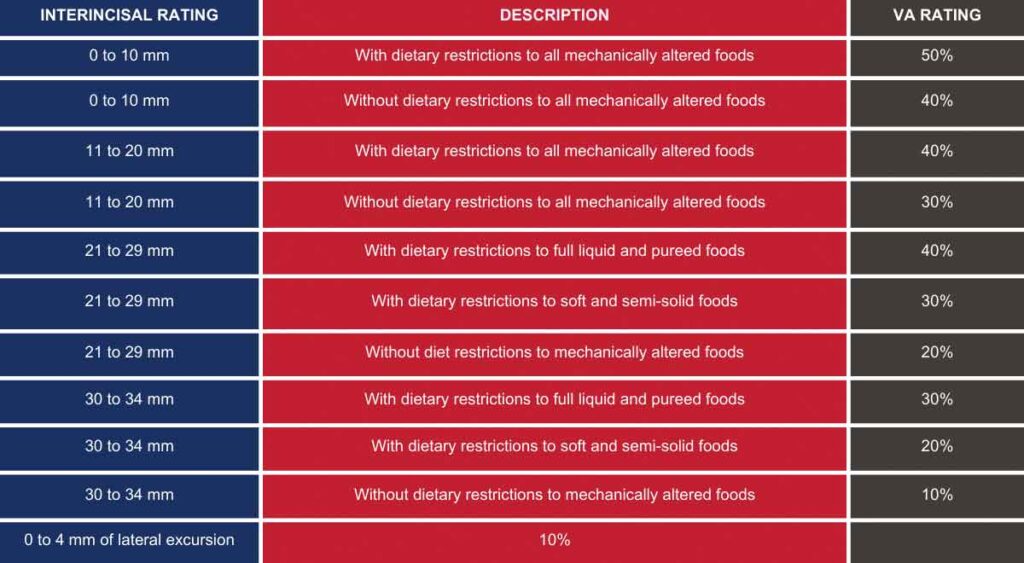Ever wake up with a stiff jaw, a dull headache, or sensitive teeth? You might be grinding your teeth at night, a condition called bruxism. If you’re a veteran, understanding the VA Disability Rating for Bruxism could be crucial, because this may be linked to your time in military service.
Many veterans silently deal with bruxism, and it’s more common than you might think. It could stem from your time serving and is something a VA Disability Rating for Bruxism can directly account for.
This guide will break down everything you need to know to file a successful VA claim.
Understanding Bruxism and Its Impact on Veterans
Bruxism is the habit of clenching or grinding your teeth. It can happen when you are awake or asleep. The National Institute of Dental and Craniofacial Research points out it’s often linked to stress, anxiety, or even certain medications.
For veterans, the connection is, sadly, pretty clear. The stress of military service, combined with service-connected conditions such as post-traumatic stress disorder (PTSD), can trigger this response. Studies on Gulf War veterans show a strong link between bruxism and increased levels of stress.
This seemingly simple health condition can lead to some significant issues.
The Signs and Symptoms
There are a variety of signs and symptoms. These issues could also show up:
- Teeth that appear flattened teeth or chipped.
- Increased sensitivity to temperature and chewing.
- Teeth worn enamel, making the inner layer visible.
- Trouble getting quality sleep.
- Muscles in your jaw feel tight or exhausted.
- A clicking or popping jaw.
- Ongoing, consistent pain.
- Dull headaches that feel more like a tense ache than a pounding migraine.
Over time, bruxism can result in some major damage like temporomandibular joint (TMJ) disorders.
There can also be damage to restorations or crowns and even tooth loss. Over time, you might find damage to your jaw.
Common Causes for Veterans
Many things can affect Veterans. Here are some:
- Post-traumatic stress and mental health conditions can lead to grinding your teeth.
- Disruptions in your sleep, such as insomnia, may also increase instances of sleep bruxism.
- Dealing with long periods of stress, you can manifest physical effects and lead to teeth grinding.
- Injuries from a traumatic brain injury (TBI), can sometimes disrupt normal function. This could be a source of bruxism.

VA Disability Rating for Bruxism: How it Works
The VA doesn’t have a specific VA rating just for bruxism itself. The condition gets evaluated based on the problems it *causes*.
It’s frequently recognized as a “secondary condition.” Think of it like a domino effect, something else triggers it. Let’s dive in deeper.
Secondary Service Connection: The Key Link
Many veterans find that their bruxism is a direct result of another condition they developed during service. Common examples are:
- PTSD: Research connects teeth grinding and post-traumatic stress disorder. People dealing with the emotional aftershocks of trauma may grind their teeth, awake or asleep.
- Anxiety: High anxiety levels can tense up your jaw muscles. This can be classified as one of the mental health disorders that leads to clenching and grinding.
- Tinnitus: While it might seem counterintuitive, bruxism can *cause* tinnitus, not the other way around. The jaw clenching puts pressure on the jaw bones and it causes the ear to ring. A VA disability rating for tinnitus due to service-connected bruxism could mean you receive compensation.
- Sleep Apnea: There’s a potential link between teeth grinding and sleep apnea. It is a connection you might explore with your doctor. People dealing with sleep apnea do struggle to get a full night of sleep which can also cause other sleep issues like teeth grinding. A VA disability claim could account for this.
- Migraines: Those tense jaw muscles are a potential factor causing this issue. This may lead to tension and a lot of discomfort for those dealing with the headaches. Consider exploring a VA disability claim in this instance.
To get a VA disability rating, you need to show the link. Here are the requirements:
- A confirmed medical diagnosis of bruxism.
- Proof of your existing, service-connected condition (like PTSD or a back injury).
- Solid medical evidence that connects your bruxism to the main condition.
Diagnostic Codes Used for Bruxism Ratings
Because bruxism has a range of potential issues, there’s no specific diagnostic code. However, the VA uses codes for *related* service-connected conditions.
The two most common are:
- Diagnostic Code 9905 (Temporomandibular Disorder, or TMD): This covers problems with your jaw joint and surrounding muscles. This is common if bruxism has caused jaw pain, limited movement, or clicking.
- Diagnostic Code 9913 (Tooth Loss): Severe, unchecked bruxism can damage or even lead to losing teeth.
Knowing this helps you understand the VA process for a bruxism VA claim.
Understanding the Rating Criteria
Let’s break down how the VA looks at these conditions. We can explore what kind of disability ratings to expect:
TMJ/TMD Ratings (Diagnostic Code 9905)
The VA looks at the jaw’s range of motion and how it affects what food can be handled. This falls under the Dental and Oral conditions under the Diagnostic Code 9905.
The key is something called “maximum unassisted vertical opening”. Here is a range of situations:

“Mechanically altered foods,” mean things like blended or mashed foods.
It also factors in the need for a mechanically altered diet.
Tooth Loss Ratings (Diagnostic Code 9913)
If grinding leads to actual tooth loss, ratings range from 0% to 40%. Diagnostic code (DC) 9913 details this.
It needs to be directly connected to your service or an existing service-connected disability.
Filing Your VA Disability Claim for Bruxism
You’ve got options for your disability claim. You can file online for disability benefits.
There is also completing and sending in VA Form 21-526EZ, by mail or fax. You can also head to a VA regional office.
Keep in mind, as of late 2024, the VA is taking about 139 days to process claims. This would include a bruxism secondary claim.
Essential Evidence: What You Need to Gather
The stronger your evidence, the better chance to get an approved claim for a service connection.
- Medical records: A clear diagnosis, including treatment and your dentist’s notes on wear and tear. This is the most crucial element in getting your claim approved.
- A Nexus Letter: This is a crucial document. You will need a doctor’s professional opinion stating the connection of the bruxism to your primary service-connected condition.
- Lay statements: Written statements can provide another view to make it real. Statements from friends, family, or even a partner who has heard you grinding, adds weight to your claim for a secondary service connection.
- Service records: Your personal files and details of stressful events. You may want to pull a service file report, to tie issues to your PTSD diagnosis and help you receive the correct VA disability benefits.
Think of it like building a strong case for disability compensation.

Possible Roadblocks: Challenges You Might Face
There’s no specific diagnostic code for teeth grinding alone. It is hard proving that the secondary service-connected connection between teeth grinding and a condition that *is* service-connected.
Even though there is a mountain of information of data out there, sometimes it can still be a struggle.
Other Conditions Linked to Bruxism
Many health conditions can be tangled up. Bruxism sometimes shows up alongside:
- Other Mental Health Conditions: Conditions beyond PTSD, such as depression, could contribute.
- Other Disorders: Bruxism can be associated with other medical and mental health disorders, such as gastroesophageal reflux disorder, Parkinson’s disease, and attention-deficit/hyperactivity disorder.
- Certain Medications: Some antidepressants and other psychiatric medications list bruxism as a side effect. People of a certain personality type may be more prone.
- Sleep Disorders: Bruxism may also coincide with night terrors, according to research.
Conclusion
Dealing with the constant pain and potential damage of bruxism is tough. Know that the VA Disability Rating for Bruxism exists to support veterans and can provide the benefits you need.
Do your homework, get organized, and you’ve got this. We here at Vet Claim Solutions work hard for veterans like you that may develop bruxism and are in need of assistance.
It can be a tough slog but getting the support you earned is achievable.


